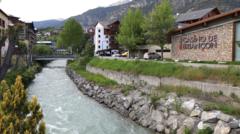Miller Gardner, the 14-year-old son of former New York Yankees outfielder Brett Gardner, died from carbon monoxide poisoning while vacationing with his family in Costa Rica, officials confirmed. According to the Costa Rican Judicial Investigation Agency, a toxicology report revealed a dangerously high level of carboxyhemoglobin in his blood, measuring 64 percent saturation. To put this into perspective, levels exceeding 50 percent are considered lethal.
The incident took place while the Gardner family was staying at a resort in Manuel Antonio, a popular tourist destination on the central Pacific coast. Authorities indicated that Miller fell ill along with several family members, and despite the tragic circumstances, his family released a statement through the Yankees that he "passed away peacefully in his sleep" on March 21.
The investigation into his death concluded that the family's accommodations were near a room housing machinery, which may have contributed to the carbon monoxide leak. Although the resort has not publicly commented on the findings, the family reflects on memories of Miller, citing his love for sports and outdoor activities, which included football, baseball, golf, hunting, and fishing.
Brett Gardner, who spent his entire major league career with the Yankees from 2008 to 2021, garnered considerable admiration during his time as a key player, contributing to the team's 2009 World Series championship victory. The Gardners have another son, 16-year-old Hunter, and reside in South Carolina.
This heartbreaking incident serves as a sobering reminder of the risks associated with carbon monoxide, especially in environments where ventilation may be inadequate. Citizens and travelers alike are urged to be vigilant about safety measures when staying in vacation settings to prevent similar tragedies in the future.


















